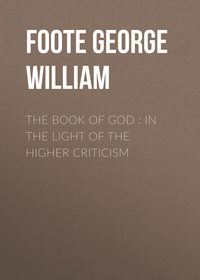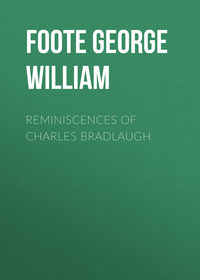 полная версия
полная версияBible Romances, First Series
The serpent, we have said, could converse in human speech. His conversation and his conduct will be dealt with in the Romance just referred to. Suffice it here to say that he plainly told the woman that God was a liar. "He," said the tempter, "has said ye shall surely die if ye touch the fruit of this tree. Don't believe it. I tell you, ye shall not surely die." What could poor Eve think? In addition to her native curiosity here was another incentive to disobedience. Which of these two spoke the truth? There was only one way of deciding. She stretched forth her hand, plucked an apple, and began to eat. And immediately, says Milton,
"Earth felt the wound, and nature from her seat,
Sighing through all her works, gave signs of woe
That all was lost."
What a rumpus about a trifle! It reminds us of the story of a Jew who had a sneaking inclination for a certain meat prohibited by his creed. One day the temptation to partake was too strong; he slipped into a place of refreshment and ordered some sausages. The weather happened to be tempestuous, and just as he raised his knife and fork to attack the savory morsel, a violent clap of thunder nearly frightened him out of his senses. Gathering courage, he essayed a second time, but another thunderclap warned him to desist. A third attempt was foiled in the same way. Whereupon he threw down his knife and fork and made for the door, exclaiming "What a dreadful fuss about a little bit of pork."
Eve's transgression, according to the learned Lightfoot, occurred "about high noone, the time of eating." The same authority informs us that she and Adam "did lie comfortlesse, till towards the cool of the day, or three o'clock afternoon." However that may be, it is most certain that the first woman speedily got the better of the first man. She told him the apple was nice and he took a bite also. Perhaps he had resolved to share her fortunes good or bad, and objected to be left alone with his menagerie. Lightfoot describes the wife as "the weaker vessell," but a lady friend of ours says that the Devil stormed the citadel first, knowing well that such a poor outpost as Adam could easily be carried afterwards.
Having eaten of the fruit, and thus learned to distinguish between good and evil, Adam and Eve quickly discovered that they were naked. So they "sewed fig leaves together, and made themselves aprons." We are not told who gave them lessons in sewing. Perhaps they acquired the art through intuition. But the necessary implements could not have been gained in that way. Dr. Thomas Burnet, whose mind was greatly exercised by the astounding wonders of the Bible, very pertinently asked "Whence had they a needle, whence a thread, on the first day of their creation?" He, however, could give no answer to the question, nor can we, except we suppose that some of the female angels had attended a "garden party" in Eden and carelessly left their needles and thread behind them. Any reader who is dissatisfied with this explanation must inquire of the nearest parson, who, as he belongs to a class supposed to know almost everything, and believed to have access to the oracles of God, will doubtless be able to reveal the whole gospel truth on the subject.
A little later, God himself, who is everywhere at once, came down from everywhere to the Garden of Eden, for the purpose of taking a "walk in the cool of the day." He had perhaps just visited the infernal regions to see that everything was ready for the reception of the miserable creatures he meant to damn, or to assure himself that the Devil was really not at home; and was anxious to cool himself before returning to his celestial abode, as well as to purify himself from the sulphurous taint which might else have sent a shudder through all the seraphic hosts. Apparently he was holding a soliloquy, for Adam and Eve "heard his voice." Colenso, however, renders this portion of the Romance differently from our authorised version – "And they heard the sound of Jehovah-Elohim walking in the garden in the breeze of the day." Delitzsch thinks they heard the sound of his footsteps, for God used to visit them in the form of a man! Could the force of folly farther go? Any devout Theist, who candidly thought over this petty fiction, would find its gross anthropomorphism inexpressibly shocking.
Knowing that God was everywhere, Adam and Eve nevertheless "hid themselves from the presence of the Lord God amongst the trees of the garden." But they were soon dragged forth to the light. Adam, who seems to have been a silly fellow, explained that he had hidden himself because he was naked, as though the Lord had not seen him in that state before. "Naked!" said the Lord, "Who told thee that thou wast naked. Hast thou eaten of that tree, eh?" "O, Lord, yes," replied Adam; "just a little bit; but it wasn't my fault, she made me do it, O Lord! O Lord!" Whereupon God, who although he knows everything, even before it happens, was singularly ill-informed on this occasion, turned fiercely upon the woman, asking her what she had done. "Oh, if you please," whimpered poor Eve, "it was I who took the first bite; but the serpent beguiled me, and the fault you see is not mine but his. Oh dear! oh dear!" Then the Lord utterly lost his temper. He cursed the serpent, cursed the woman, cursed the man, and even cursed the ground beneath their feet Everything about at the time came in for a share of the malison. In fact, it was what the Yankees would call a good, all-round, level swear.
The curse of the serpent is a subject we must reserve for our pamphlet on "The Bible Devil," The curse of the woman was that she should bring forth children in pain and sorrow, and that the man should rule over her. With her present physiological condition, woman must always have suffered during conception as she now does; and therefore Delitzsch infers that her structure must have undergone a change, although he cannot say in what respect He dwells also on the "subjection" of woman, which "the religion of Revelation" has made by degrees more endurable; probably forgetting that the Teutonic women of ancient times were regarded with veneration, long before Christianity originated. Besides, the subordination of the female is not peculiar to the human race, but is the general law throughout the animal world.
Adam's curse was less severe. He was doomed to till the ground, and to earn his bread by the sweat of his face. Most of us would rather take part in the great strenuous battle of life, than loll about under the trees in the Garden of Eden, chewing the cud like contemplative cows. What men have had to complain of in all ages is, not that they have to earn their living by labour, but that when the sweat of their faces has been plenteously poured forth the "bread" has too often not accrued to them as the reward of their industry.
Orthodox Christianity avers that all the posterity of Adam and Eve necessarily participate in their curse, and the doctrine of Original Sin is taught from all its pulpits. Only by baptism can the stains of our native guilt be effaced; and thus the unbaptized, even infants, perish everlastingly, and hell, to use the words of a Protestant divine, holds many a babe not a span long. A great Catholic divine says – "Hold thou most firmly, nor do thou in any respect doubt, that infants, whether in their mothers' wombs they begin to live and then die, or when, after their mothers have given birth to them, they pass from this life without the sacrament of holy baptism, will be punished with the everlasting punishment of eternal fire." Horror of horrors! These men call sceptics blasphemers, but they are the real blasphemers when they attribute to their God such supreme injustice and cruelty. What should we think of a legislator who proposed that the descendants of all thieves should be imprisoned, and the descendants of all murderers hung? We should think that he was bad or mad. Yet this is precisely analogous to the conduct ascribed to God, who should be infinitely wiser than the wisest man and infinitely better than the best.
The crime of our first parents was indeed pregnant with the direst consequences. It not only induced the seeds of original sin, but it also brought death into the world. Milton sings —
"Of man's first disobedience,And the fruit Of that forbidden tree,Whose mortal tasteBrought death into the world."And Saint Paul (Romans v., 12) writes "As by one man sin came into the world, and death by sin."
Now this theory implies that before the Fall the inhabited portion of the world was the scene of perfect peace. Birds lived on seeds and eschewed worms, and the fierce carniverous animals grazed like oxen. The lion laid down with the lamb. "Waal," said the Yankee, "I don't doubt that, but I rayther guess the lamb was inside." The fact is that most of the carnivorous animals could not live on a vegetable drat; and therefore they must either have subsisted on flesh before the Fall, which of course involves death, or their natures must have undergone a radical change. The first supposition contradicts scripture, and the second contradicts science.
Geology shows us that in the very earliest times living creatures died from the same causes which kill them now. Many were overwhelmed by floods and volcanoes, or engulphed by earthquakes; many died of old age or disease, for their bones are found distorted or carious, and their limbs twisted with pain; while the greater number were devoured, according to the general law of the struggle for existence. Death ruled universally before the human race made its appearance on the earth, and has absolutely nothing to do with Eve and her apple.
Adam and Eve were warned by God that in the day they ate of the fruit of the Tree of Knowledge they should surely die. The serpent declared this to be rank nonsense, and the event proved his veracity. What age Eve attained to the Holy Bible saith not, for it never considers women of sufficient importance to have their longevities chronicled. But Adam lived to the remarkably good old age of nine hundred and thirty years. Like our Charles the Second he took "an unconscionable time a-dying." One of his descendants, the famous Methusaleh, lived thirty-nine years longer; while the more famous Melchizedek is not even dead yet, if any credence is to be placed in the words of holy Saint Paul.
But all these are mere lambs, infants, or chicken, in comparison with the primeval patriarchs of India. Buckle tells us that, according to the Hindoos, common men in ancient times lived to the age of 80,000 years, some dying a little sooner and some a little later. Two of their kings, Yudhishther and Alarka, reigned respectively 27,000 and 66,000 years. Both these were cut off in their prime; for some of the early poets lived to be about half a million; while one king, the most virtuous as well as the most remarkable of all, was two million years old when he began to reign, and after reigning 6,800,000 years, he resigned his empire and lingered on for 100,000 years more. Adam is not in the hunt with that tough old fellow. On the principle that it is as well to be hung for a sheep as a lamb, faithful Christians should swallow him as well as Adam. When the throat of their credulity is once distended they may as well take in everything that comes. What followed the Curse clearly shows that man was not originally created immortal. Adam and Eve were expelled from the Garden of Eden expressly in order that they might not become so. God "drove them forth" lest they should "take also of the tree of life, and eat, and live for ever." Many orthodox writers, who have to maintain the doctrine of our natural immortality, preserve a discreet silence on this text. Our great Milton, who has so largely determined the Protestant theology of England, goes right in the face of Scripture when he makes God say of man,
"I at first with two fair giftsCreated him endowed, with happinessAnd immortality."The fact is, the Book of Genesis never once alludes to any such thing, nor does it represent man as endowed with any other soul than that "breath of life" given to all animals. It is also certain that the ancient Jews were entirely ignorant of the doctrine of a life beyond the grave. The highest promise that Moses is said to have made in the Decalogue was that their "days should be long in the land." The Jews were a business people, and they wanted all promises fulfilled on this side of death.
Nor is there any real Fall implied in this story. God himself says that "the man," having eaten of the forbidden fruit, "is become as one of us." That could scarcely be a fall which brought him nearer to God. Bishop South, indeed, in a very eloquent passage of his sermon on "Man Created in God's Image," celebrates the inconceivable perfection of the first man, and concludes by saying that "An Aristotle was but the rubbish of an Adam, and Athens but the rudiments of Paradise." But a candid perusal of Genesis obliges us to dissent from this view, Adam and Eve were a very childish pair. Whatever intellect they possessed they carefully concealed. Not a scintillation of it has reached us. Shakespeare and Newton are an infinite improvement on Adam and Eve. One of the Gnostic sects, who played such havoc with the early Christian Church, utterly rejected the idea of a Fall. "The Ophites," says Didron, "considered the God of the Jews not only to be a most wicked but an unintelligent being… According to their account, Jalda-baoth, the wicked demi-god adored by the Jews under the name of Jehovah, was jealous of man, and wished to prevent the progress of knowledge; but the serpent, the agent of superior wisdom, came to teach man what course he ought to pursue, and by what means he might regain the knowledge of good and evil. The Ophites consequently adored the serpent, and cursed the true God Jehovah."
Before expelling Adam and Eve from Eden, the Lord took pity on their nakedness, and apparently seeing that their skill in needle-work did not go beyond aprons, he "made coats of skins, and clothed them." Jehovah was thus the first tailor, and the prototype of that imperishable class of workmen, of whom it was said that it takes nine of them to make a man. He was also the first butcher and the first tanner, for he must have slain the animals and dressed their skins.
Lest they should return he "placed at the east of the Garden of Eden Cherubims, and a flaming sword which turned every way, to keep the way of the tree of life." As this guard seems never to have been relieved, profane wits have speculated whether the Flood drowned them, and quenched the flaming sword with a great hiss. Ezekiel describes the Cherubims with characteristic magnificence. These creatures with wings and wheels were "full of eyes round about." And "everyone had low faces: the first face was the face of a cherub, and the second face was the face of a man, and the third the face of a lion, and the fourth the face of an eagle." What monsters! No wonder they effectually frightened poor Adam and Eve from attempting a re-entrance into the Garden.
Perhaps the reader would like to know what became of the Tree of Knowledge. One legend of the Middle Ages relates that Eve along with the forbidden fruit broke off a branch which she carried with her from Paradise. Planted outside by her hand, it grew to a great tree, under which Abel was killed; at a later time it was used in building the most holy place of Solomon's temple; and finally it yielded the beams out of which the cross was made! Another legend says that, after the Fall, God rooted out the Tree of Knowledge, and flung it over the wall of Paradise. A thousand years after it was found by Abraham, none the worse for its long absence from the soil. He planted it in his garden, and while doing so he was informed by a voice from heaven that this was the tree on whose wood the Redeemer should be crucified.
Space does not allow us to dwell at length on the Paradise Myths of other ancient peoples, which singularly resembled that of the Jews. Formerly it was alleged that these were all corruptions of the Genesaic story. But it is now known that most of them date long anterior to the very existence of the Jewish people. As Kalisch says, "they belonged to the common traditionary lore of the Asiatic nations." The Bible story of Paradise is derived almost entirely from the Persian myth. It was after contact with the reformed religion of Zoroaster, during their captivity, that the remnant of the Jews who returned to Palestine collated their ancient literature, and revised it in accordance with their new ideas. The story of Eve and her Apple is, as every scholar knows, an oriental myth slightly altered by the Jewish scribes to suit the national taste, and has absolutely no claims on our credence. And if this be so, the doctrine of the Fall collapses, and down comes the whole Christian structure which is erected upon it.
THE BIBLE DEVIL
BIBLE ROMANCES. – 4
By G. W. FOOTE.
The Christian Godhead is usually spoken and written of as a Trinity, whereas it is in fact a Quaternion, consisting of God the Father, God the Son, God the Holy Ghost, and God the Devil. The Roman Catholics add yet another, Goddess the Virgin Mary. God the Devil, whom this Romance treats of so far as his history is contained in the Bible, is popularly supposed to be inferior to the other persons of the Godhead. In reality, however, he is vastly their superior both in wisdom and in power. For, whereas they made the world, he has appropriated it almost entirely to himself; and, whereas they who created all its inhabitants, have only been able to lay down a very narrow-gauge railway to the Kingdom of Heaven, he has contrived to lay down an exceedingly broad-gauge railway to the Kingdom of Hell. Few passengers travel by their route, and its terminus on this side is miserably small; but his route is almost universally patronised, its terminus is magnificent, and there is an extraordinary rush for tickets.
According to the Christian scheme, the Devil tempted Adam and Eve from their allegiance to God in the form of a serpent. He played the devil with Eve, she played the devil with Adam, and together they have played the Devil with the whole human race ever since.
But let any unbiassed person read the Genesaic story of the Fall, and he will certainly discover no reference to the Devil A serpent is spoken of as "more subtle than any beast of the field;" it is throughout represented simply as a serpent; and nowhere is there the faintest indication of its possessing any supernatural endowments.
The Story of the Fall contains clear relics of that Tree and Serpent worship which in ancient times prevailed so extensively over the East. The serpent was formerly regarded as the symbol of a beneficent God. In Hindustan, says Maurice, "the veneration of the serpent is evident in every page of their mythologic history, in which every fabulous personage of note is represented as grasping or as environed with a serpent." According to Lajard, the word which signifies "life" in the greater part of the Semitic languages signifies also "a serpent" And Jacob Bryant says that the word "Ab," which in Hebrew means Father, has also the same meaning as the Egyptian "Ob," or "Aub," and signifies "a serpent," thus etymologically uniting the two ideas. The Tree and the Serpent were frequently associated, although they were sometimes worshipped apart. The Aryan races of the Western world mostly worshipped the Tree alone. The Scandinavians had their great ash "Yggdrasill," whose triple root reaches to the depths of the universe, while its majestic stem overtops the heavens and its branches fill the world. The Grecian oracles were delivered from the oak of Dodona, and the priests set forth their decrees on its leaves. Nutpi or Neith, the goddess of divine life, was by the Egyptians represented as seated among the branches of the Tree of Life, in the paradise of Osiris. The "Hom," the sacred tree of the Persians, is spoken of in the Zendavesta as the "Word of Life," and, when consecrated, was partaken of as a sacrament. An oak was the sacred tree of the ancient Druids of Britain. We inherit their custom of gathering the sacred mistletoe at Yule-tide, while in our Christmas Tree we have a remnant of the old Norse tree-worship. During the Middle Ages the worship of trees was forbidden in France by the ecclesiastical councils, and in England by the laws of Canute. A learned antiquary remarks that "the English maypole decked with colored rags and tinsel, and the merry morice-dancers (the gaily decorated May sweeps) with the mysterious and now almost defunct personage, Jack-in-the-green, are all but worn-out remnants of the adoration of gods in trees that once were sacred in England."
Now the serpent and the tree were originally both symbolic of the generative powers of nature, and they were interchangeable. Sometimes one was employed, sometimes the other, and sometimes both. But in that great religious reformation which took place in the faiths of the ancient world about 600 years before the time of Christ, the serpent was degraded, and made to stand as a symbol of Ahriman, the god of evil, who, in the Persic religion, waged incessant war against Ormuzd, the god of beneficence. The Persian myth of the Fall is thus rendered from the Zendavesta by Kalisch: —
"The first couple, the parents of the human race, Meshia and Meshiane, lived originally in purity and innocence. Perpetual happiness was promised them by Ormuzd, the creator of every good gift, if they persevered in their virtue. But an evil demon (Dev) was sent to them by Ahriman, the representative of everything noxious and sinful. He appeared unexpectedly in the form of a serpent, and gave them the fruit of a wonderful tree, Hom, which imparted immortality and had the power of restoring the dead to life. Thus evil inclinations entered their hearts; all their moral excellence was destroyed. Ahriman himself appeared wider the form of the same reptile, and completed the work of seduction. They acknowledged him instead of Ormuzd as the creator of everything good; and the consequence was they forfeited for ever the eternal happiness for which they were destined."
Every reader will at once perceive how similar this is to the Hebrew story of the Fall. The similarity is intelligible when we remember that all the literature of the ancient Jews was put into its present form by the learned scribes who returned with the remnant of the people from the Babylonish captivity, and who were full of the ideas that obtained in the Persian religion as reformed by the traditional Zoroaster.
As we have said, the Hebrew story of the Fall contains clear relics of Tree and Serpent worship. There is also abundant proof that during the long ages in which the Jews oscillated between polytheism and monotheism this worship largely prevailed. Even up to the reign of Hezekiah, as we find in the Second Book of Kings, the serpent was worshipped in groves, to the great anger of the king, who cast out the idolatry from among his people.
Having explained the subject thus, let us now assume with orthodox Christians that the serpent in Eden was animated by the Devil, or was indeed the Devil himself incarnate.
We have already observed that the Devil excels his three rivals in wisdom and in power. While they were toiling so strenuously to create the world and all that therein is, he quietly stood or sat by as a spectator. "All right," he might have murmured, "work away as hard as you please. You've more strength than sense. My turn will soon come. When the job is finished we shall see to whom all this belongs." When the work was completed and they had pronounced all things good, in stepped the Devil, and in the twinkling of an eye rendered imperfect all that they had so labored to create perfect;'turning everything topsy-turvey, seducing the first pair of human beings, sowing the seeds of original sin, and at one stroke securing the wholesale damnation of our race. What were they about, to let him do all this with such consummate ease? Surely they must have slept like logs, and thus left the whole game in his hands. He made himself the "prince of this world," although they created it; and if those may laugh who win, he was entitled to roar out his mirth to the shaking of the spheres.
Besides being the prince of this world and of the powers of darkness, the Devil is described as the father of lies. This, however, is a gross libel on his character. Throughout the contest with his rivals he played with perfect fairness. And from Genesis to Revelation there can be adduced no single instance in which he departs from the strict line of truth. On one occasion when Jehovah desired a lying spirit to go forth and prophesy falsely to his people, he found one ready to his hand in heaven and had no need to trouble Satan for a messenger. The Lord God had told Adam, "Of the tree of knowledge of good and evil, thow shalt not eat of it; for in the day that thou eatest thereof thow shalt surely die." Nay, said the Devil, when he began business "ye shall not surely die; for God doth know that in the day ye eat thereof, then your eyes shall be opened, and ye shall be as gods, knowing good and evil." Every word of his speech was true. Instead of dying "in the day" that he ate of the fruit Adam lived to the fine old age of nine hundred and thirty years.











